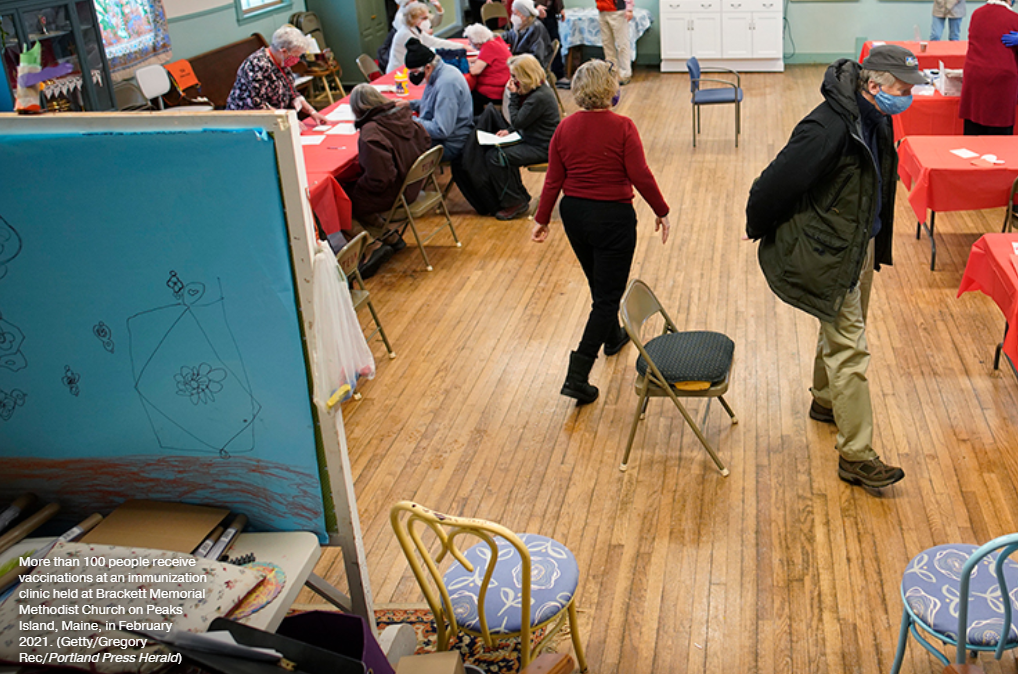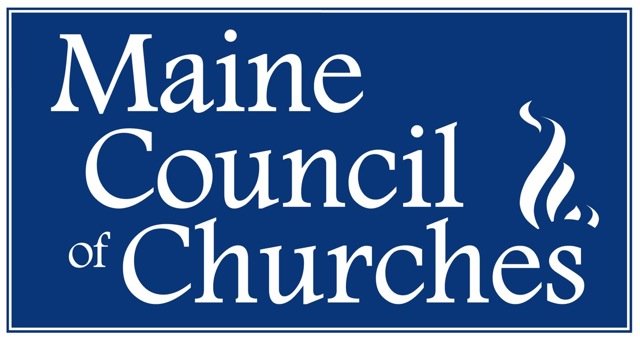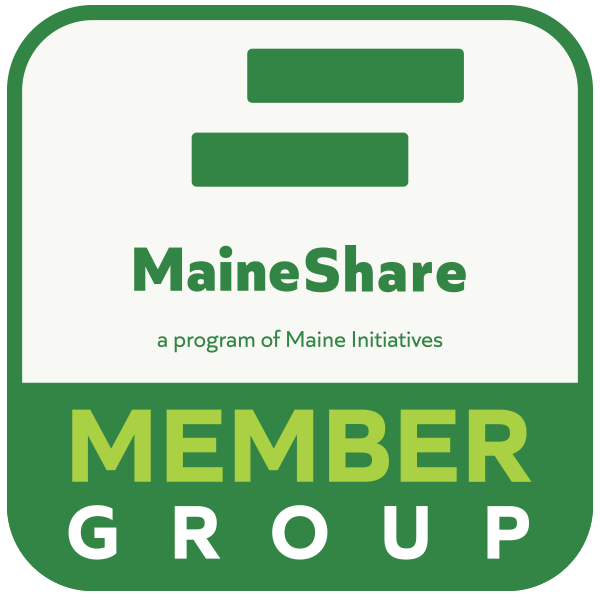Maine Provides Leadership on Religion and Vaccines

Article Nov. 22, 2021
Author Guthrie Graves-Fitzsimmons
americanprogress.org
A Q&A With Rev. Jane Field of the Maine Council of Churches
The Rev. Jane Field of the Maine Council of Churches shares her thoughts on Maine’s approach to containing COVID-19, as well as the response from religious communities in the state.

Maine is currently facing a surge in COVID-19 cases, and its state leadership continues to push for more people to get vaccinated. As of November 18, 2021, 71.6 percent of Maine’s population is fully vaccinated, compared with 58.9 percent of the U.S. population. Gov. Janet Mills (D-ME) announced last week that all adults 18 and older are now eligible to receive a COVID-19 booster shot. In a press release announcing the decision, Maine Department of Health and Human Services Commissioner Jeanne Lambrew stated: “Maine’s strong vaccination rate is saving lives and reducing hospitalizations and deaths. But, with the continued surge of the Delta variant, we must do all we can to protect Maine people from this deadly virus and ease the burden on our health care workers.” The push to get people vaccinated in Maine has also involved discussions about the intersection of religion and public health. Maine has recently eliminated religious and philosophical exemptions for vaccine mandates in the state that apply to schoolchildren as well as health care workers and day care employees. Gov. Mills’ COVID-19 vaccine mandate for health care workers was challenged in the federal court system by plaintiffs who argued that it infringed on their religious freedom; the U.S. Supreme Court upheld the mandate in a 6-3 decision.
Given these developments and their relevance to policymakers across the country, the Center for American Progress interviewed the Rev. Jane Field, executive director of the Maine Council of Churches (MCC), which is composed of seven member denominations representing 437 congregations in the state. Rev. Field has been active in public policy debates about religion and public health before and during the COVID-19 pandemic. She is an ordained Presbyterian minister who has served Presbyterian, Methodist, Lutheran, and Episcopal congregations in Maine, New York, and Connecticut. In addition, Rev. Field has worked for nonprofit organizations that serve victims of domestic violence and homeless individuals. She holds a Master of Divinity from Union Theological Seminary in New York City and a master’s degree in public policy and international affairs from the Woodrow Wilson School of Public and International Affairs at Princeton University.
This interview, conducted via email in November 2021, has been lightly copyedited and condensed.
“God frees us to love—not harm—others.
“
Rev. Jane Field
CAP: When the coronavirus pandemic began, we saw two major responses from religious communities across our country: Most chose to adapt their services to save lives, while a small portion fought against public health orders and politicized religious liberty, essentially suggesting it should give them license to spread the virus. What was your reaction to how religious communities reacted at the beginning of the pandemic?
Rev. Field: In the early days of the pandemic, we at the Maine Council of Churches quickly reached out to the leadership of our seven member denominations, convening an online meeting of bishops, executives, and conference ministers to review the state’s Center for Disease Control and Prevention (CDC) guidelines and requirements. While each denomination would establish its own policies and issue its own statements, together we issued a joint statement, and we agreed that MCC would, in consultation with the state CDC office, develop a general set of guidelines and best practices for churches and also offer a series of information-sharing webinars for faith leaders. We worked with staff at the CDC and the Wisconsin Council of Churches to publish “At the Threshold” in April 2020. Throughout these early days, we also issued public statements urging churches to refrain from in-person gatherings inside their buildings.
While the vast majority of our member denominations’ congregations followed science-based guidance and abided by Gov. Mills’ safety rules, there were some churches in Maine who flagrantly defied the guidance and mandates, urging their congregants to gather in person, indoors, unmasked, without social distancing, and to include communal singing in their services. Not surprisingly, more than one such congregation became the site of “superspreader” events, causing many to contract COVID-19 and then spread it to others throughout the state. One church in Maine even brought a lawsuit, claiming it was an issue of “religious liberty” to be able to gather for public worship despite the public health risk; the lawsuit was quickly dismissed by the courts.
We were shocked and dismayed at this reckless and defiant behavior by this small minority of churches, and we condemned it publicly, urging all churches, whether their denominations were members of our council or not, to abide by the safety protocols recommended by the CDC and by the limits to in-person gatherings put in place by the governor. We believed then, and we still believe, that the principles guiding people of faith in their response to the pandemic should be love of neighbor and the command to protect the most vulnerable among us. We publicly expressed our skepticism about claims that First Amendment rights to religious liberty entitle faith communities to gather without adhering to science-based safety guidelines. In our opinion, these assertions reflect problematic interpretations of the biblical concepts of freedom and liberty. Ultimately, God frees us to love—not harm—others.
Rev. Jane Field
We believe that when such exercise of religious freedom promotes a risk to public health, it becomes antithetical to the very core of our deepest-held beliefs.
CAP: On September 1, 2021, Maine’s L.D. 798, which was signed into law in May 2019, went into effect. The legislation requires students from preschool through 12th grade to be vaccinated against certain diseases unless they have a medical exemption. The law no longer allows for philosophical and religious exemptions. Why did the Maine Council of Churches decide to support this legislation?
Rev. Field: We supported removal of the religious exemption for school vaccinations. We were also part of a large statewide coalition, Maine Families for Vaccines, that worked to successfully prevent a “people’s veto” of the legislation in a statewide referendum. We took this stand because, although we are firm proponents of an individual’s right to exercise one’s religion, we believe that when such exercise of religious freedom promotes a risk to public health, it becomes antithetical to the very core of our deepest-held beliefs—that God calls us to love our neighbors as ourselves; to protect the weak, marginalized, and vulnerable; and to make sacrifices on behalf of others.
The Maine Council of Churches also was concerned that parents might use the religious exemption to evade vaccination laws once the philosophic exemption was eliminated. This is exactly what a law professor at the University of California Hastings College of the Law found when she was researching religious exemptions: Dorit Rubinstein Reiss wrote in a law journal article in 2014 that parents in numerous posts on anti-vaccination websites admitted to openly lying, saying they claimed a religious exemption just to get around the law, even though they did not practice any religion at all, or were atheists. To have religion used as a pawn in the service of deceit is deeply offensive to us.
“As the U.S. Supreme Court stated in 1941, the right to practice religion freely does not include liberty to expose the community to communicable disease
“
Rev. Jane Field
CAP: Maine Gov. Janet Mills has required all health care workers in the state be fully vaccinated, and the mandate does not include religious exemptions. What has been the reaction to this rule from religious communities in Maine?
Rev. Field: Just as there were some religious communities here in Maine who objected and defied safety rules, science-based guidelines, and government mandates for other aspects of pandemic response, there have been some who have spoken out in favor of allowing health care workers to claim religious exemptions to avoid being vaccinated for COVID-19. While MCC has not made any specific public comment on the mandate for health care workers, we did issue a public statement in September, making it clear that we feel there is a moral mandate for all people to be vaccinated.
We believe it is the way to love both God and neighbor and end the devastation wrought by the COVID-19 pandemic. We stand firm in our rejection of religious exemptions for vaccination, including for the COVID-19 vaccine. This is not a matter of so-called religious liberty, as some have argued. As the U.S. Supreme Court stated in 1941, “The right to practice religion freely does not include liberty to expose the community … to communicable disease”—a position Justice Antonin Scalia affirmed in 1990. More importantly for us, this is a matter of faith-based compassion and justice. The Maine Council of Churches is rooted in Hebrew and Christian scriptures, where the moral imperative is clear: Be mindful of and protect your neighbors, especially those who are most vulnerable and marginalized. The way to do that in the midst of this crisis is also clear: Get vaccinated.
CAP: The U.S. Supreme Court rejected a challenge to Gov. Mills’ order from nine health care workers who objected to receiving the shots on religious grounds. What is your message for policymakers who are trying to weigh arguments such as these?
Rev. Field: None of MCC’s seven member denominations—who represent 437 local congregations and 55,000 members here in Maine and who are the largest mainline Protestant denominations in the United States—hold any doctrine, teaching, or belief that there is a “religious” reason for a member of their church to claim exemption from being vaccinated. Furthermore, all of our denominations support protecting children and adults from diseases that can spread throughout a community and have the potential to cause extreme illness and death.
CAP: What can we learn from the COVID-19 pandemic about religious exemptions in public policymaking? What lessons are there to learn that would apply to debates around religious exemptions from nondiscrimination laws or access to reproductive health care?
Rev. Field: At a time when our nation is so profoundly divided, and those sowing division try to politicize even something as basic as relying on scientific evidence to promote public health and save lives, it is deeply troubling to see some even go so far as to use religion as a pawn or a shield to advance a political agenda. Yet at the same time, it seems unreasonable and unrealistic to expect policymakers to be able to make nuanced judgments about theological and doctrinal claims about religions they may not even practice themselves.
Even so, I do not think it’s too much to expect that the public and those who make policy could rely on the overwhelming majority of leaders of the world’s mainline religions who have been clear, at least in the case of vaccination: There are no moral, doctrinal, or scriptural grounds in their traditions for exempting a believer from receiving a vaccine that has proven to be safe and effective.
“To have religion used as a pawn in the service of deceit is deeply offensive to us.
“
Rev. Jane Field
We at the Maine Council of Churches support, defend, and protect the dignity and rights of LGBTQ+ people, and we work for reproductive justice, supporting the right of patients and their doctors to determine their care, including abortion, and promoting equitable access to reproductive health care, including abortion services. We do so in our state legislature, and we do so standing firmly with our roots in Hebrew and Christian scripture. Legislators must weigh that testimony alongside the testimony from other faith-based advocates who claim an opposing point of view based on their beliefs.
One lesson we have learned here in Maine is how vitally important it is for the progressive voice of faith to speak up in the public square; for far too often, it is only one voice the public and legislature have been hearing—the more conservative perspective. And they mistakenly assume that that voice speaks for all people of faith. We are here to remind the public and policymakers that the more conservative perspective most certainly does not speak for all people of faith.
Conclusion
The lessons learned in Maine are important for religious communities, public health officials, and policymakers across the United States: The decision to rescind religious and philosophical exemptions to vaccine mandates didn’t pit religious groups against public health officials, but rather was welcomed by many religious groups in the state. Maine’s strong vaccination rate against COVID-19 is a testament to public officials and religious communities working together for the common good. The core religious principles of caring for others and loving one’s neighbor mean doing all we can to save lives during a pandemic.

